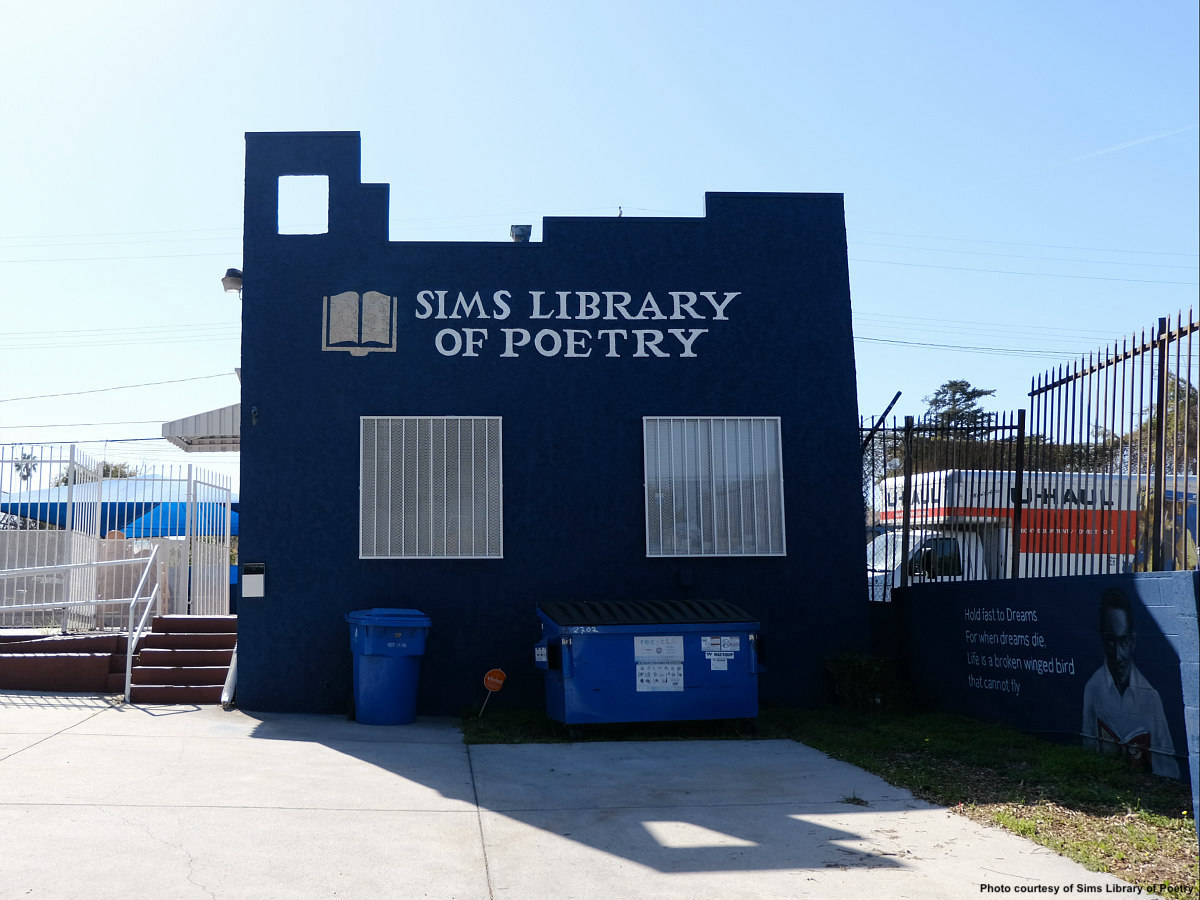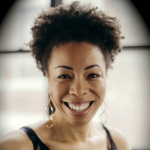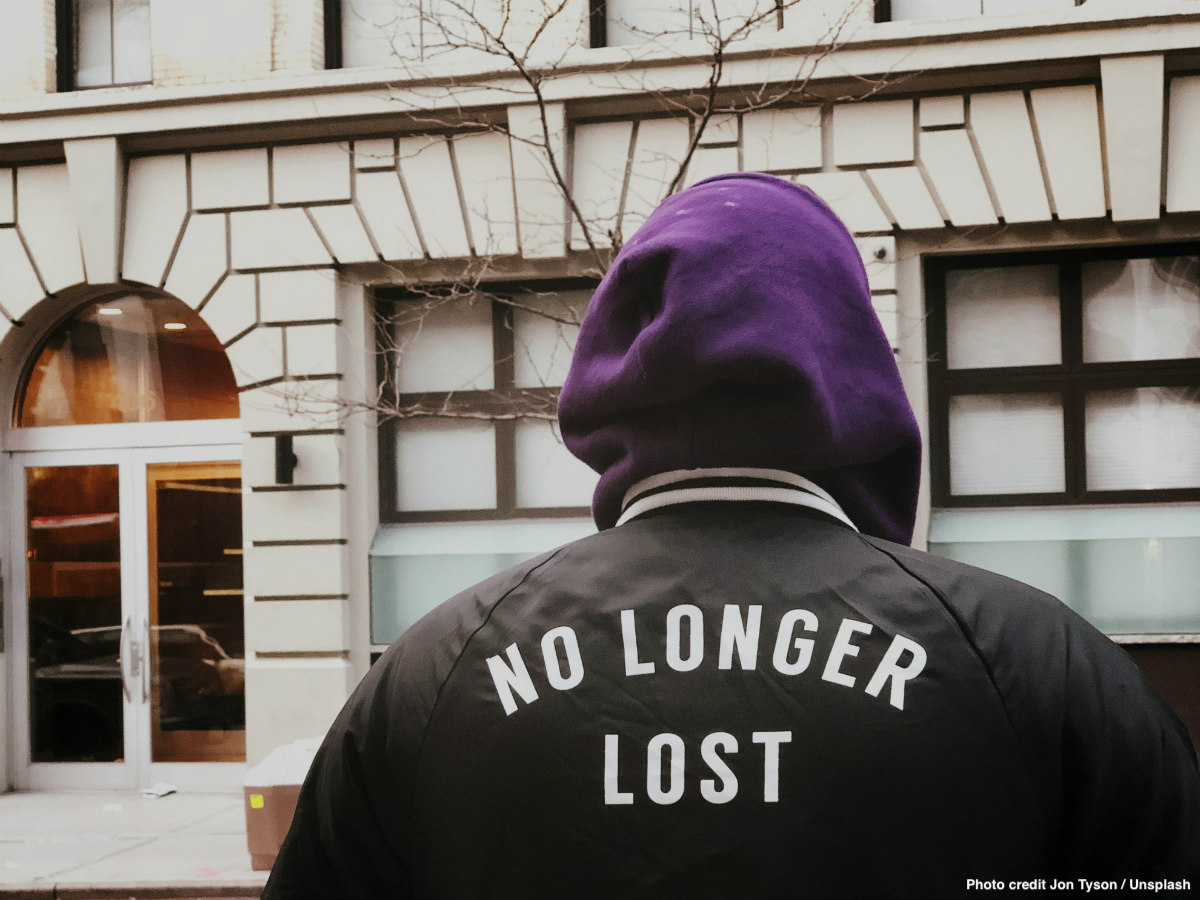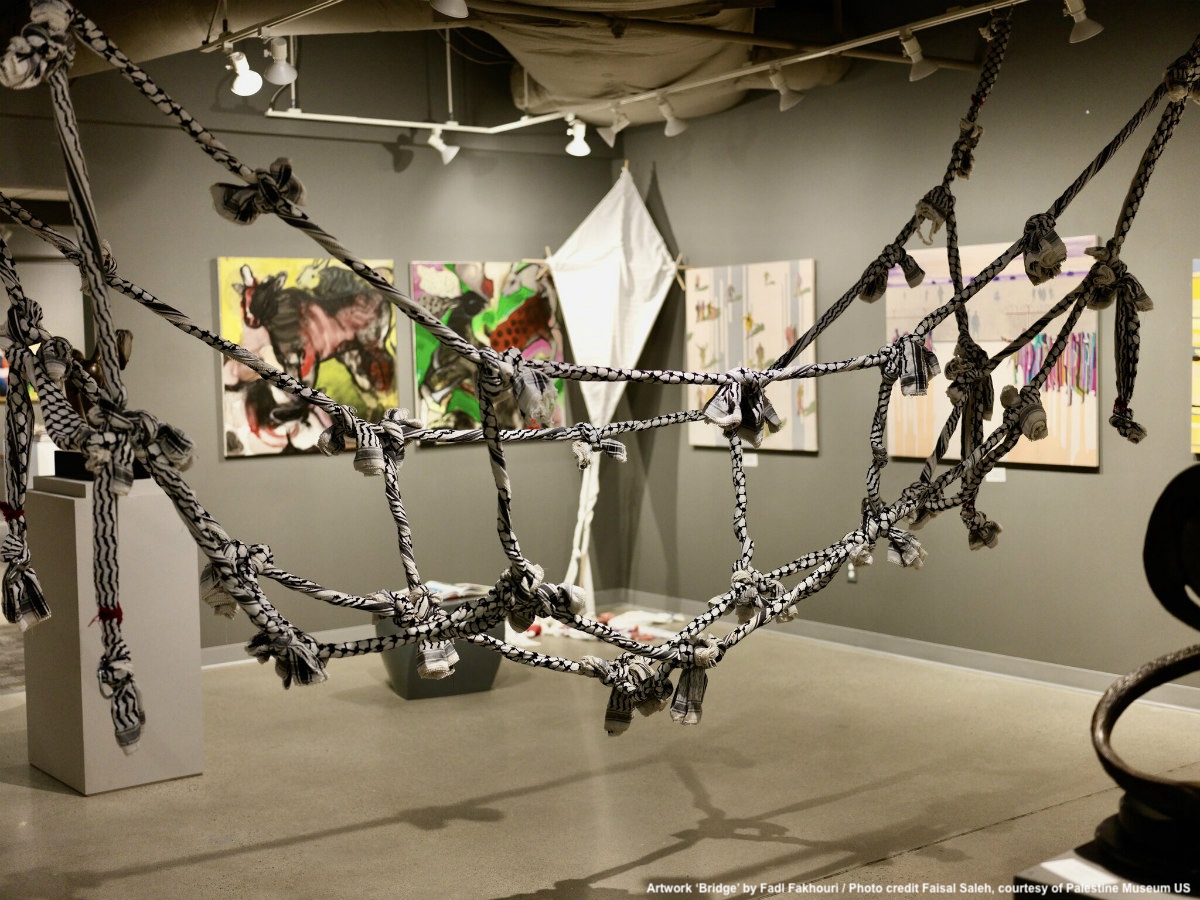It is a warm winter day in Los Angeles, California. I am a poet in search of urban spaces that support poetry and that search has brought me back to my hometown. As I drive down Florence Avenue, a major thoroughfare in South (Central) Los Angeles, I note how much has changed in the last three decades: palm trees line its meridian, pops of color decorate neighborhood businesses, new coffee shops, a glossy metro station, colorific signs advertising vegan food.
Just beyond the metro station, I see a large black sign with bold white letters that reads, “Poetry Lives Here.” Behind the sign sits an unassuming cobalt blue building with two white windows that seem like a pair eyes peering out to the world. I have arrived at the Sims Library of Poetry, the first black-owned library dedicated solely to poetry in Los Angeles, and the state of California.
Before you enter the Library, you can sense its chill, restorative vibe — a contrast from how urban spaces are often depicted in the media. Spacious outdoor couches and tables rest under a wide canopy providing an oasis-like space to read and chat with friends. Inside, walls lined from floor to ceiling with black shelves are filled with more volumes of poetry than most public libraries— books on poetry craft and its history, children’s poetry, periodicals on poetry, poetry collections that are over 100 years old, even a volume of poetry that doubles as a cookbook.
In the center of the space, plush black couches with decorative pillows provide space for people to read and relax. Here in the main room events ranging from writing classes for childrens’ book authors to evening open mics are held. Just beyond the space is a private workroom designed for the writer in mind: poetry lines from remarkable poets like Mary Oliver, Lao Tzu, and Rainer Rilke tattooed on the wall, a modest workspace, and natural light to spark creativity. At the Sims Library of Poetry, poetry reigns.
*****
The Sims Library of Poetry began in a suitcase. After teaching the Community Literature Initiative (CLI) publishing class at USC (University of Southern California) for some years, Hiram Sims, creator of the Library and LA native, tasked his newest crop of students with reading one poetry collection per week. Weeks later, he noticed that none of his students had read one book of poetry. He asked them why, and their answer surprised him: the public library across the street did not have a poetry section. In disbelief, he went to that library only to confirm his students’ assessment. He ventured to other libraries and noticed that some of these spaces had only a scant amount of poetry, or scattered the few volumes they did have across the fiction section.
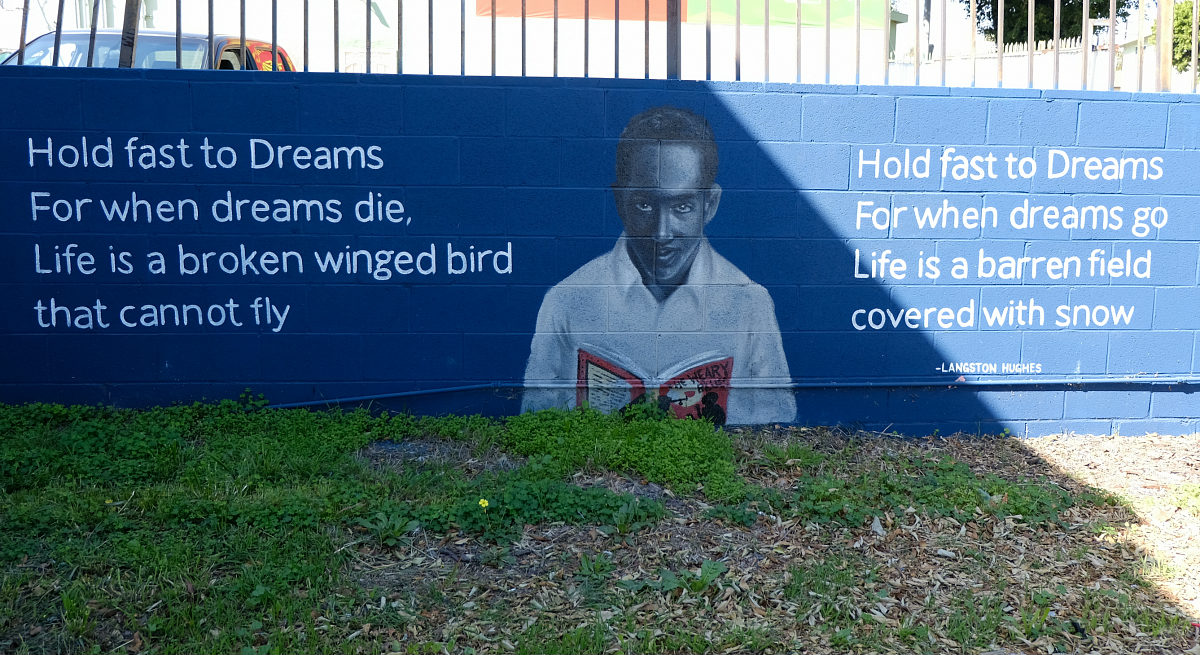
Frustrated, yet inspired, Sims gathered 80 books of poetry from his personal library, placed them in a suitcase, and rolled it into his weekly CLI class. As the students picked out which volume they’d read that week, one of the students remarked, “This is the little Sims Library of Poetry right here.” Two years later, with some initial designs in hand, Sims, his students, and his brother transformed his garage into a microcosm of what would become the Sims Library of Poetry on Florence Avenue.
When Sims hosted a birthday celebration to commemorate the occasion, he asked all his guests to do one thing— bring poetry books to fill the shelves. That day, July 6, 2019, began with 300 books in his library-garage. By the end of the day, he had amassed over 2,000 books. He was onto something big.
*****
Hiram Sims has always had poetry in his life. A poet, essayist and creative writing professor, he credits growing up in the Black church with his love for poetry. From the time he was six months old, he was regularly exposed to the poetry of the Psalms. Their rhythm, musicality and words seeped into his being. Those recitations and performances of poetry, he noted, demonstrated the impact and effect that language has on people. By 4th grade, his English class had proclaimed him “the Captain of Limerick Poems. He’d later go on to study creative writing and poetry at the USC.
One thing that I want people to understand about poetry is that it is a worthy thing to write. It is proof of our humanity and has the power to humanize people who have been dehumanized.
Today, he welcomes me into his office just beyond the library’s main room and immediately I get the sense that this is a man of the word, of poetry. Books of poetry line his waist-high shelves, a short stack of books and papers cover his desk. He is an amicable man of stature, with an affable smile, dressed casually in khakis and a button down plaid shirt. He sits back in his office chair and we begin to talk about all things poetry.
“I wanted a space for us,” he began. He commented on the tenuous existence of poetry spaces in cities. How availability and accessibility to (live) open mics and other poetry spaces is highly dependent on a venue’s operating hours and interests. I nod in agreement knowing what it’s like to find such spaces in the big city, then a few months later learn they have disappeared into the ether. As one of Sims’ friends told him, “Poetry is homeless.” At the Library, though, poetry has a home. In fact, that statement was the impetus for the sign I read out front: “Poetry Lives Here.” Gone are the days of poetry without a home. “We have all the days and all nights for poetry,” he said with satisfaction.
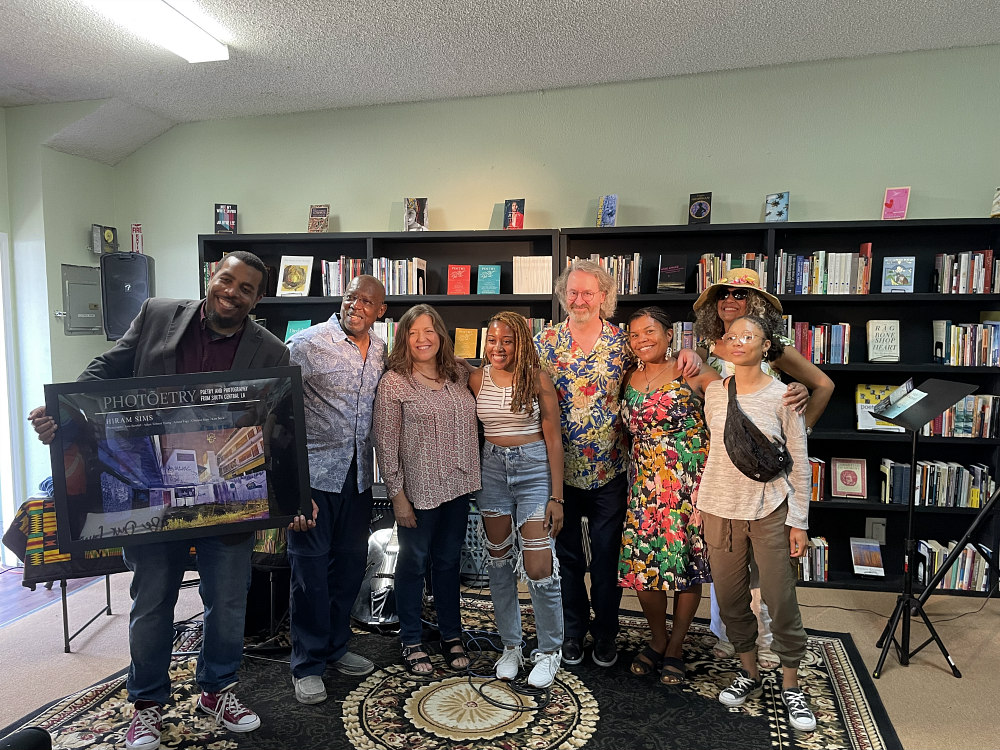
I comment that the space feels specifically designed for the interiority and expressive nature of the poet. “We are consciously thinking about creating environments and frequencies at which people can read,” he tells me. “People have a hard time reading because they are always on the move.” And he’s right. Urbanization, the gig economy, and digital technologies challenge our ability to reconnect with ourselves. Even on the day of the interview we were both pressed for time. Still, urban spaces that allow reconnection and exploration are few and often inaccessible. At the Sims Library of Poetry the constant grind and hustle, the push to strive without rest, is left outside, and a meditative, creative space is cultivated inside.
The library offers workshops such as “Writing Is Healing” and “Writer’s Block… of Time” and regularly invites people to write in the company of live music. They even have a garden to satisfy a poet’s green thumb. The Library also partners with CLI and World Stage Press to publish the works of poets in LA. The Library, he remarks, is an “ecosystem that prioritizes language and all that language has to teach us about ourselves and each other.”
What surprises him most about the library is that people don’t realize that they can borrow books. That as a lending library it operates with the same functionality as any public library. “People come here and sit a while, sometimes take two or three books and read, but when they are ready to leave they put the books back.” He reassures them that they can take the books home and return them when they are due. Patrons are surprised and relieved to hear that.
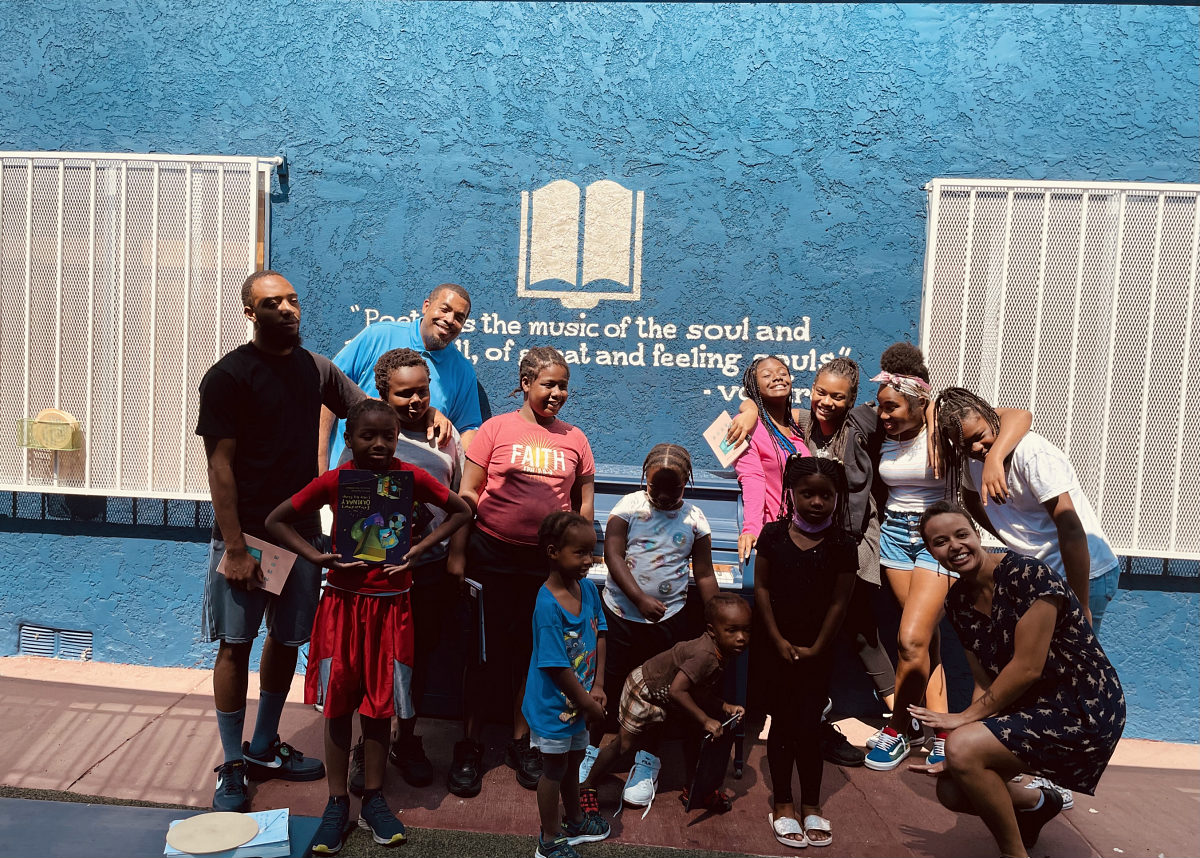
And the community appreciates it. “The community has embraced us. They were surprised at first. Like, when did you get here, when did this happen,” he tells me. I nod in solidarity with the community’s surprise and gratitude for the Library’s presence. “One thing that I want people to understand about poetry is that it is a worthy thing to write. It is proof of our humanity and has the power to humanize people who have been dehumanized.” Poetry offers a counter to the dehumanizing attitudes and perceptions directed at Black and Brown people, and other vulnerable people in urban spaces. In the midst of a homelessness crisis, economic instability as a result of a pandemic, urban spaces where Angelenos can create, share, experience joy and remind all of us of our shared humanity are critical.
I end our time together with two questions poets are always asked: who is your favorite poet and what is your favorite poem. Sims mentions Marcus B. Christian, a Black poet of the Harlem Renaissance who hailed from Louisiana and his poem “The Craftsman.” In true poet fashion Sims recites the poem to my hearing. As he recites these words,
“I ply with all the cunning of my art This little thing, and with consummate care
I fashion it—so that when I depart,
Those who come after me shall find it fair
…I leave behind
This thing that in return this solace gives:
He who creates true beauty ever lives,”
I consider the spaces in our cities created to support our humanity, our joy, as poetry does, and how vital they are to our existence. I marvel at the home that Sims’ love for poetry built and bear witness that poetry, indeed, lives here.
